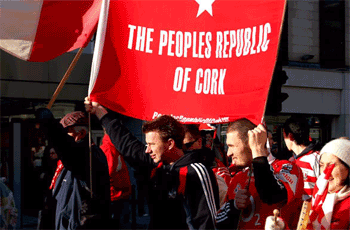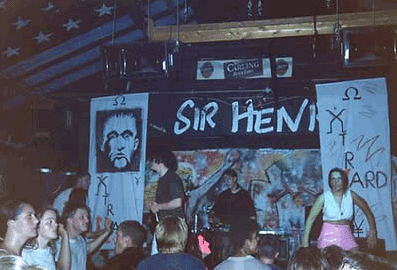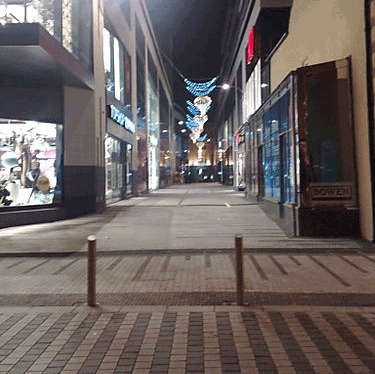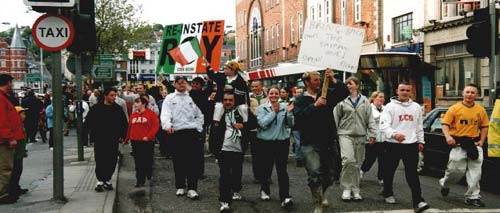Moments from a Cork Decade
28th Dec 2009
Moments from a Cork Decade
A few memorable moments from the annals of the People's Republic to remind us
of the highs and lows of the first decade of the new millennium…
The 'Rebelutions'
In decades past the GAA off-season was a time for low-key AGMs and little else.
The past decade has been anything but - with Cork's hurlers deciding enough
was enough in 2002 and taking the previously unthinkable step of going on strike
over their acute frustrations with the county board. A year later they were
in an All-Ireland final and continued to be until 2006 - narrowly missing out
on a Liam McCarthy three-in-a-row.
In 2007 the flames of revolution were relit as Teddy Holland was forced to resign as football banisteoir following, among other events, two large street protests in the depths of winter - his appointment seen by fans and footballers as reverting to the old ways of nudge 'n' wink politics at the Cork County Board.
Another winter of arguably the most tumultuous discontent in GAA history followed in 08/09 with Gerald McCarthy's eventual departure. The decision to produce a 'development squad' to hurl in the absence of the protesting senior squad split the county down the middle so profoundly that comparisons with the Civil War became commonplace.
The local upheaval
symbolised both Corkonians' fiery determination to put 'right' on a perceived
wrong and the struggle of a younger energetic generation for legitimacy in an
organisation seen to be dominated by stifling 'just leave it the way it is'
style inertia. While the outlook in Cork GAA might currently be described as
'calm and settled' it may take another decade to put proper perspective on the
past years of turmoil.
 |
Hope
for a generation: the 'Shoppers March' in Feb 2009 with 10,000 supporters |
The Closing
of Henrys
Since its inception in 1978 the venue had become the pulse of contemporary nightlife
in the city hosting the likes of Sonic Youth, Nirvana and The Pogues long before
they became world famous. As dance music took a foothold Henry's deep house
night 'Sweat' became a European dance mecca - long used as a symbol to taunt
Dublin's faux-authenticity as the heart-beat of Irish clubbing - its legendary
atmosphere and friendliness has been documented everywhere from television programmes
and international music publications to local hurlers' biographies.
Along with the cessation of big club nights like Mór Disco, Yo Latino and Telefunkin' and the effervescent Radio Friendly the club's closure in November 2002 paralleled the end of the dominance of the DJ as the live music scene began again to flourish again and new swanky looking venues (with acceptably hygienic toilets) presented themselves to pickier punters. Henry's inability to reinvent itself for a new generation eventually forced it to pay the ultimate price.
Despite high-falutin'
Celtic-Tiger plans for super-plush apartments the site, like the Cineplex and
surrounding buildings, still lies poignantly ugly and idle contrasting with
the swish make-over of Grand Parade. The legendary stories live on however and
the documentary-making has only just begun.
 |
Henrys:
In its early days in the late-eighties. |
The Regeneration
of Cork City
Despite the current economic woes and recent submerging under flood waters,
Cork city has managed to shake off almost all of the dank greyness of the last
century that typified depressed urban areas of Ireland: the recent endorsement
by Lonely Planet as a top ten city is strong evidence of the progress that has
been made.
Work began before the millennium on the city's drainage system which tested the patience of citizens to breaking point and right into the mid-noughties. For long periods busy thoroughfares like Patrick Street, Grand Parade and Oliver Plunkett Street were encased in eight foot high blue hoardings turning much of the city centre into a giant building site.
The task was tough and painstakingly slow but as the blue walls disappeared a neater looking Cork emerged from the dilapidation of the past - cracked footpaths and potholed roadways replaced with fancy stone and silky smooth surfaces.
The closing of Roches Stores and its rebranding as UK giant Debenhams typified the unstoppable march of globalisation as local favourites are regularly replaced by big name brands. The nostalgia, like that of Sir Henrys and other favourites lives on but so do the economic realities of price competition and ultimately, jobs.
There's still much to be done as clusters of unsightly tackiness (like those awful giant plastic signs on Patrick's Quay) and rotting buildings still infect the city's charm but with schemes like Opera Lane, Lavitt's Quay, Half Moon Street, Cornmarket St, Lapps Quay and so on there's far more to be positive about.
Known locally as 'The Idle Tower' because of its lack of tenants The Elysian is a symbol of Celtic Tiger ambition in the first decade of the new millennium. Regardless of what it set out to be commercially, Corkonians can set aside their cynicism and allow themselves to bask in the knowledge that it is officially Ireland's tallest building. That means it's higher than anything in Dublin which floods any Corkonian's brain with pleasure endorphins: we are the winners of them.
 |
Opera
Lane formerly Faulkners Lane aka the Wino's Toilet Bowl now looking the
berries. |
Saipan
Although most of us don't really know where it is the very word is likely to
split Irish people down the middle since the summer of 2002. Captain Roy Keane
was sent home by manager Mick McCarthy after a bust-up concerning the Mayfield
man's protests against the FAI's joke-treatment of players. The last straw in
a lifelong string of incompetencies being the provision of a car park to train
in just days before their first match against Cameroon.
While Irish fans were split down the middle Corkonians were united behind the Manchester United captain and several large street marches took place demanding the reinstatement of one of the city's favourite sons. The incident would become a symbol of Ireland's difficult struggle in shaking off its low-aspiring self-apologetic minnow past to a confident state hell bent on high standards.
Despite the eventual vindication of his position by the Genesis Report Keane's return under Brian Kerr was greeted by boos at Landsdowne Road by many simple minded Irish soccer fans who have conspired to rewrite history. Despite the facts many soccer fans mistakenly still believe Keane left the squad of his own volition.
 |
See
the famous 2002 interview here |





























